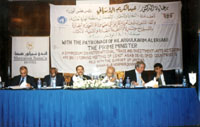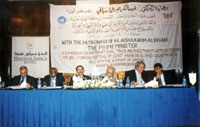
Yemen’s Joining WTO, heated debates [Archives:2000/46/Business & Economy]
November 13 2000

Can least developed countries, including Yemen, overcome negative consequences of globalization? What are the conditions and requirements countries should meet to join the WTO?
These queries were put before participants in the “Symposium, International Trade and Investment Issues. WTO Accession Brainstorming Meeting of Least Developed Countries, 6-8November 2000- Sana’a.” Sponsored by the Yemeni government and UNCTAD, the symposium included a deliberation meeting of least developed Arab countries. A number of experts from WTO, UNCTAD, ESCWA, Arab league and Yemen participated in the meeting.
YT followed up the issues discussed in the symposium and filed the following report:
World Trade Trends and Globalization
UNCTAD expert Murray Gibbs, presented a paper on international trade system and trends towards globalization which in economic terms means internationalization of the process of goods and services production, and investment and distribution. More than one country are involved in the production of one or part of certain commodity. However, there are no geographical boundaries hindering investment and no specific place for influx of capitals except for tempting profits and stable environment for investors. Therefore, international trade orientation requests are made from least developed countries to adopt practical policies and measures enabling them to catch up with WTO. Among those measures are recommendations of the WB and IMF in terms of heading for free-market economy and working in accordance with its mechanisms based on supply & demand, removal of price imbalances, liberalizing goods and services prices from government intervention, liberalizing foreign trade, interest prices, privatizing public establishments and tackling problems caused by debts.
WTO, its activities mechanism:
WTO was established in 1995 which has 139 member states and trade organizations. A paper presented by Cato Adrian, expert in the WTO, has indicated that the organization works according to rules based on “GATT”, Uruguay Round of 1994.
According to experts WTO is considered to be the most outstanding mechanism embodying globalization as it clearly aims at fully freeing foreign trade, working for stability of trade systems and committed to the principle of most favorable state and using tariff as the only good means for any external trade policy and preventing any kind of unfair external competition giving attention to national dealing with foreign goods flowing across borders of various countries.
The other face of globalization and its negative outcomes on developing countries comes through expanding activities of multi-national companies. There are about 550 companies controlling the economies of many countries. They affect investment, production and trade trends among many countries in the world. These companies do also monopolize selling basic commodities and services in different markets in addition to trading with information technology.
Prospects of Yemen’s Joining WTO
On Yemen’s joining the WTO, Najib Hamim, Communication and Coordination with WTO chairman, talked about the current negotiations. He indicated that Yemen was labeled as a least developed country, therefore this requires WTO help to increase volume of foreign capitals investment in available sectors. Besides, it needs to be offered technical assistance to increase its industrial and agricultural exports.
Dr. Abdulkarim al-Eryani, PM, in his address delivered at the symposium, said “Yemen initiated procedures to join the WTO since 1998. A national committee was formed to prepare procedures and to negotiate Yemen’s becoming a member of the organization. The committee had also to prepare the plans, policies, programs and researches needed to enhance and help Yemen’s joining the organization.”
He pointed out that Yemen and some other Arab countries were trying to join the organization. He revealed that the Ministries of Planning and Supply and Trade were authorized to prepare a national paper to participate in the third conference of the UN for the least developed countries scheduled in Brussels during May 2001 where 48 least developed countries were going to participate.
Rubens Ricupero, Secretary General of UNCTAD, stressed the importance of helping least developed countries by the developed ones so as to achieve the positive effects of freeing world trade. He emphasized that international treaties pertaining to improving investment atmosphere should be made use of so as to enhance development and solve problems such as population increase, natural disasters and other economic problems.
Strategies & Measures to Join WTO
Bualaam Aktov, UNDP resident representative in Sana’a, expressed the organization’s commitment to help countries to make use of positive effects of globalization and ridding them of the economic problems.
Victor Ognivtsev and Tokio Yamaoka indicated in a paper that any country that wanted to join the WTO had to face three stages of negotiations. They said “Countries have to make multi-lateral negotiations to discuss the economic and trade systems in the country that wanted to join the organization. Bilateral negotiations should be focused on giving up customs tariff and commitments pertaining to agricultural subsidy, goods access to markets in addition to bilateral negotiations centered on commitments to services trade,called negotiations on services access to markets.
Problems Facing Joining of WTO:
Economic and trade experts perceive that Yemen’s request to join the WTO faces many challenges the most outstanding of which are the difficulties of opening local markets and flooding it with products and goods of WTO members, specially concerning implementation of 24 mandatory agreements for removing barriers and customs restraints before trading with the organization’s members.
Dr Da’ood Othman, Economics professor, Commerce Faculty, Sana’a University, asserted the importance of sound preparation for requirements of negotiations with the WTO and that there should be changes of economic laws and proper mechanisms necessary for implementation of WTO agreements.
Investment, Financial Matters, Foreign Debts
Under this theme, UNCTAD expert, Nazha Abbas presented a paper highlighting the need of data base and visibility for investment in order to attract foreign capitals.
TRIMS bans all investment procedures that do not agree with commitments stipulated in GATT. As for foreign debts the UNCTAD presented a program DEMFAS for debt management and analysis to demonstrate to least developed countries how to get rid of their debts.
In Yemen Debt issues have been connected with the authorities concerned such as ministries of Planning and Finance and COCA to study loans burdens. The UNCTAD helps gather data and offers technical help. Dr. Mohammed Saeed Al-Attar, Yemen’s representative in Geneva discussed the traders’ delay in paying back debts which burden the national economy.
Results of discussions show the necessity of paying more attention to loans servicing and revealing debts’ interests to volume of imports and local products and their impact on development projects. The IMF identifies loans servicing in least developing countries as 20-21% of imports.
Technical Aspects of Accession to WTO
In this premise, the Yemeni National Committee explained the preparatory phase for trade policies memo. This memo will be distributed to all members of the organization. The technical aspects include training the negotiators and a project presented by the UNCTAD, WTO and the Intentional Trade Center to help Yemen negotiate with the organization.
A participant said to the Yemen times that Yemen would get three advantages by joining the WTO; Yemen’s development and trade policies will be outlined towards an international market, it will deal with more free environment of commercial exchange and it will participate in dialogues and discussions that will serve its trade interests.
However, discussions also warned against a hurry in joining the WTO pointing out the fact that local agricultural products will be greatly affected by the flow of foreign cheap products.
Discussions centered on the need to reconsider strategies of agricultural development, make studies and researches on production, marketing and import, improve the agricultural infrastructure, looking for new markets for export, etc.
——
[archive-e:46-v:2000-y:2000-d:2000-11-13-p:./2000/iss46/b&e.htm]


